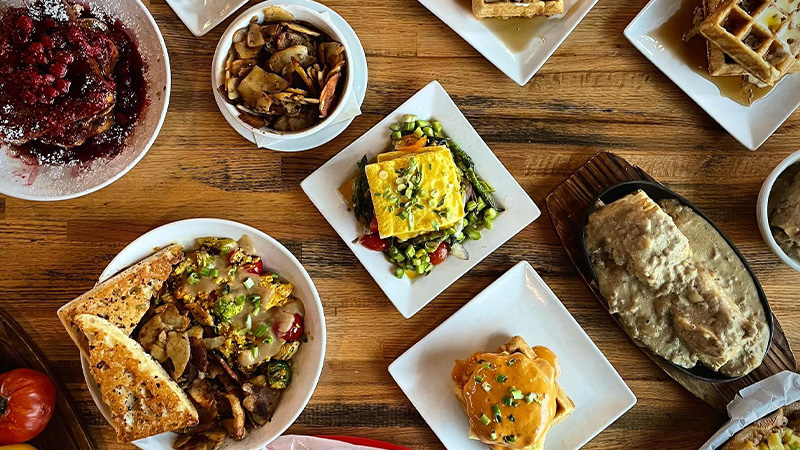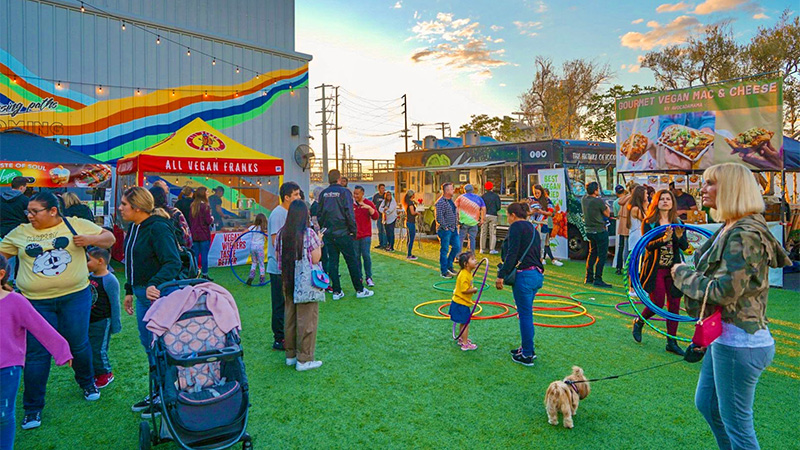Seeking business opportunities through unsolicited emails requires ample optimism and a sober accounting of the odds. Info@ emails often vanish into a digital black hole, especially when you’re pitching a left-of-the-dial concept: selling plant-based food at brewery taprooms.
“We sent emails to 15 or 20 breweries, thinking that maybe three or four might get back to us,” says Tiffany Gordon, the founder of New York City’s plant-based pop-up Secret Vegan Kitchen. “Almost all of them got back to us.”
Now she regularly serves plant-based Korean-style corn dogs, loaded fries, and elote dumplings at NYC breweries such as Endless Life and Fifth Hammer Brewing. Turns out Impossible cheez burgers go great with locally brewed IPAs. “The brewery connection has been amazing,” Gordon says. “It’s the basis of our business model.”
Don’t Miss A Drop
Get the latest in beer, wine, and cocktail culture sent straight to your inbox.
In the grease-splattered annals of consumption, cold beer has proven to be a worthy accomplice to chicken wings, burgers, pizza, and other pleasures of tipsy sustenance. Now as Beyond Meat sausages go mainstream, and nearly 10 million Americans follow a plant-based diet, bars and breweries are embracing a meat-free mindset.
Vegan pop-ups are pulling up to breweries to offer plant-based takes on comfort food, while brewpubs are building food programs around dairy-free pizzas, pastas, and plant-based burgers. Sports and craft beer bars are also no longer having a cow, serving inclusive food that appeals to everyone.
Plant-Based Menus Make Breweries More Welcoming
I’ve written about beer for two decades, and by now I’ve eaten my body weight in brewpub burgers and wing baskets. The carnivorous menu is standard fare for meat eaters, but my vegetarian wife is often left in culinary wasteland, forced to subsist on limp salads and freezer-frosted veggie burgers. Brewpubs rarely appear on date-night agendas.
“I try to look at a menu before I go to a place to figure out if I need to get food elsewhere, or if they’ll have something that isn’t just french fries or a salad,” says Chris Cognetti, the logistics manager for Brooklyn-based Wild East Brewing. He’s followed a plant-based diet for three years, watching meat-free options become more commonplace at breweries and bars.
After all, craft breweries have primed people to seek new flavors. Is an Impossible smash burger really so strange if you’re sipping a sour ale made with seawater? “I think most consumers are willing to at least try a plant-based option,” Cognetti says.
The dining landscape looked mighty different a decade ago in Machesney Park, Ill., located one hour south of Madison, Wis. “We’re in a very blue collar area,” says Brian Endl, who has been vegan since 1992. He later developed a passion for craft beer, inspiring him to open the country’s first vegan brewpub, Pig Minds Brewing, in 2012.

The first year, multiple people emailed the brewery to request meat and dairy options, or swore they’d never visit. “We were told that we were crazy,” Endl says. Pig Minds, though, became a vegan beacon in the region, drawing a destination-dining crowd, and the lure of fresh beer proved irresistible to locals. Drink enough Death Grip IPA while fragrant platters filled with jalapeño poppers, house-smoked BBQ sandwiches, and cauliflower wings pass by, and your rumbling stomach might win.
“It’s food and it’s delicious,” Endl says. During weekdays, he estimates that around 90 percent of his customers aren’t vegan or vegetarian. To meet demand, he nearly tripled the size of Pig Minds in 2020, adding 9,000 square feet and a wood-fired oven used to produce pizza topped with seitan pepperoni. Through plant-based food, “we’re building a stronger base,” Endl says.
You’ll also find plant-based brewpubs in Louisville, Ky., where V-Grits vegan restaurant and Chimera Brewing offers unfiltered kellerbier and a meatless take on Taco Bell’s Crunchwrap Supreme. Sage Plant Based Bistro & Brewery has four locations around Los Angeles where you can grab its housemade beers and a tofu bánh mì.
In June, plant-based brewpub Belse opened in New York City in the former Paulaner Brauhaus space. Chef Anthony Spino makes lasagna with almond ricotta and salt-cured beet carpaccio, while brewmaster Ryan Gillette, formerly of Trillium, uses the German brewing equipment to make richly decocted lagers. Don’t expect IPAs made with the milk sugar lactose, a vegan no-no.
“It’s an easy excuse for me not to offer a smoothie sour,” Gillette says, laughing. Skip the lactose, oysters, and isinglass — a fining agent made from fish guts — and beer is inherently a plant-based beverage, a vegan product without blaring it through a cruelty-free bullhorn. “You just let the beer be itself,” Gillette says.
“Creating Plant-Based Food for Carnivores”
It’s impossible to escape the politics surrounding plant-based food, to many a threat to steak dinners and Mondays that must have meat. “Vegan is a politically charged word,” says Jason Eisner, a founder of Party Beer Co. in Los Angeles. (He’s also an owner of Wolfie’s, which serves plant-based fried-chicken sandwiches with local IPAs and pilsners.)
“We never use the term vegan when referring to our brands,” he says, adding that a focus is “creating plant-based food for carnivores.” Avoiding the “v” word minimizes stigma and fosters a more welcoming environment. “We are in the business of hospitality,” says Eisner.
Party Beer partners beer, seltzers, and slushies with its wood-fired Neapolitan pizzas, hold the dairy-derived mozzarella. Additionally, every Friday the brewery hosts the Vegan Playground night market featuring more than 15 vendors offering skin care products and French baked goods alike.

Breweries offer welcoming homes for roving plant-based pop-ups, such as Southern Fried Vegan and Vuture Food. Their bills of fare lean heavy into deep-fried comfort, nary an alfalfa sprout or macrobiotic grain bowl in sight. “It’s all mostly fried food and grilled stuff,” says Gordon of Secret Vegan Kitchen, who adds that burgers are a big seller.
Rich and salty bar food is always an easier sell, a lesson learned by Ravi DeRossi. He founded New York City’s plant-based restaurant group Overthrow Hospitality, which includes long-running beer bar Proletariat. In summer 2022, Proletariat relocated to a larger location equipped with a kitchen that initially served plant-based British pub food such as Cornish pasties and bubble and squeak.
“We approached it horribly,” DeRossi says. After about three months, Proletariat overhauled the menu to feature bar food such as zucchini fries, chorizo nachos, and crispy-mushroom sliders — so far, a more successful approach. “We had to make the menu as simple and approachable as possible,” DeRossi says.
This includes language. At the beer-focused PlantPub, which has locations in Cambridge, Mass., and near Fenway Park, home to the Boston Red Sox, the menu doesn’t add any plant-based modifiers to its fried-chicken sandwiches, pizzas, and soft-serve ice cream. “We call chicken chicken,” says Pat McAuley, a co-founder. “If you look at the menu, you wouldn’t necessarily know it’s plant-based unless you read the fine print at the bottom.”
The approach works for a mainstream audience. During baseball season, the stadium-adjacent beer hall (it will reopen this spring) is thronged with sports fans downing domestic lagers alongside craft beers from places like Vitamin Sea and Maine Beer Company. “The beer aspect is so important to the whole picture,” says McAuley, rolling out a hoppy carpet for folks that might not otherwise visit a plant-based bar.
Proselytizing about the environmental benefits of plant-based food probably won’t sway most people to drop burgers from their warm, greasy hands. Bars and breweries can’t squash that beef. But when you’re drinking, fried and filling is fried and filling, no matter the breaded protein source gurgling in vegetable oil or what sits atop a puffy pizza pie.
“Anybody and everybody with any dietary restrictions can get something delicious at our brewery,” says Party Beer’s Eisner. “When it’s the right kind of plant-based food, it’s perfect for drinking beer.”